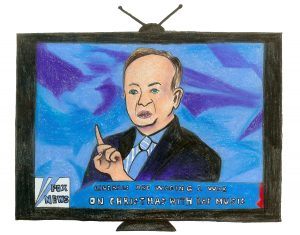Most mornings, I wake up early, pour myself a cup of black coffee and absorb the news. A quick visit to either Foreign Policyís or The Economistís website allows me to catch up on any global issues. After that, I like to read over any interesting recent case analyses published by the Harvard Law Review. If I am still awake by then, I indulge by visiting the New York Times’ opinion page, but there is one thing that I always do without fail: tune into the previous night’s episode of my favorite show, the O’Reilly Factor.
Yes, my favorite show is the O’Reilly Factor and that therefore means that Bill O’Reilly, a staunch  conservative (gasp), is one of my favorite political commentators. I know what you’re thinking, and no, I have not been brainwashed by his limited logical reasoning or his fruitless attempts at fear mongering that enforce the belief systems of only an extremely ignorant portion of the American electorate. If anything, his show has done the opposite.
conservative (gasp), is one of my favorite political commentators. I know what you’re thinking, and no, I have not been brainwashed by his limited logical reasoning or his fruitless attempts at fear mongering that enforce the belief systems of only an extremely ignorant portion of the American electorate. If anything, his show has done the opposite.
When I tune in, I have a pen ready in my hands and a yellow legal pad in my lap. During his rant sessions, I jot down counter points and form a rebuttal, which I deliver during commercials. In a way, I debate OíReilly every day, and my intellectual capacities have grown immensely as a result. However, the reason I appreciate him and his show so much go far beyond his status as a punching bag.
I am a liberal who holds liberal beliefs. I believe in the separation between church and state, that we should decrease military spending, that climate change is real and that the government has a duty to help those who cannot help themselves. But I only developed these beliefs with a single principle in mind: that politics should involve a constant search for answers rather than an endeavor to develop and defend a fixed worldview, for a stubborn mindset is the precursor of dogmatism and entrenched orthodoxy.
I want to one day contribute to solving our countryís problems. This is, for the most part, what most politicians want in some capacity regardless of which political party they identify with. Liberals and conservatives want the same thing, especially when it comes to fundamental issues such as the health of the economy. So why is it so hard to find common ground?
For a long time I maintained a caricaturized image of the Republican party in my mind. The image was racist, xenophobic, homophobic, sadistic, and would reappear whenever someone told me they were conservative. This was all because I was never exposed to different manners of thinking from my own. I read works by liberal thinkers voraciously, but I never realized how they enforced the same patterns of thinking, restricting my fixed belief system more and more. As a result of intellectual stagnation, I inadvertently reverted to the state of mind I believe the vast majority of politicians are in: egotistical complacency. The search for answers is suspended and intellectual hubris instead prevails. As a result, they are preoccupied with defending a set of beliefs by any means necessary.
At liberal universities across the country, there is currently a trend towards automatically dismissing individuals with a different viewpoint. This PC culture is an amplification of an instinctual reaction towards a caricaturized image, and it embodies intolerance. Conservative speakers like Condoleezza Rice and Christine Lagarde are regularly turned away from speaking events at liberal schools. But evangelical Christian universities frequently invite liberal speakers to share their opinions on issues like abortion
The conservative students are courteous, but they are undoubtedly left with a sense of discomfort, something similar to what I feel after listening to Ted Cruz speak for an hour. But it is out of this very sense of discomfort that our intellects are challenged and we are forced to think.
Bipartisanship pervades this nation because most decide to forgo this necessary process. Quite simply, no one wants to be proven wrong or even have their principles disputed.
But Iíd say that being proven wrong is something that should be celebrated. It means that one has escaped the clutches of a previous ideology that contained opinions too weak to hold weight. Failure to expose oneís opinions to scrutiny therefore undermines the intended purpose of politics, for progress is the result of a continuous pursuit to develop more advanced belief systems.
Opinions are but suggestions for a course of action that are entirely based on the experiences we have had, the books we have read, the people we have listened to and the news we have absorbed throughout our lives. I, nor anyone else, holds a monopoly over opinions. One can only hope to impact meaningful change if they seek to understand the place where opposing opinions come from. Part of this process involves respecting and understanding those whom we disagree with, even if it means taking my daily dose of Fox News.







